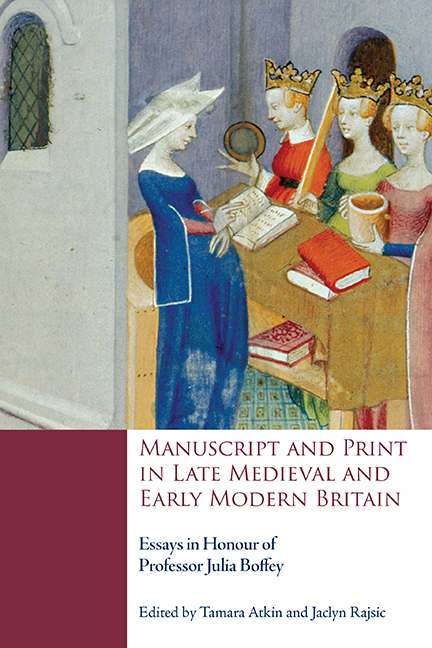 Manuscript and Print in Late Medieval and Early Modern Britain
Manuscript and Print in Late Medieval and Early Modern Britain Book contents
- Frontmatter
- Contents
- List of Illustrations
- List of Contributors
- Acknowledgements
- List of Abbreviations
- Introduction
- PRODUCING TEXTS
- READING INFLUENCE
- 8 Writing Revelation: The Book of Margery Kempe
- 9 ‘What strange ruins’: Reading Back to Thebes
- 10 Tyre in Africa: Dido's Flight and Sallust's Jugurtha
- 11 Trinitarian Piety and Married Chastity in The Pistel of Swete Susan
- 12 True Image? Alternative Veronicas in Late Medieval England
- 13 The Curelesse Wound: Henry Howard, Earl of Surrey and the Poetry of Blood
- Afterword
- Julia Boffey: A Bibliography
- Manuscript Index
- General Index
- Tabula Gratulatoria
13 - The Curelesse Wound: Henry Howard, Earl of Surrey and the Poetry of Blood
from READING INFLUENCE
Published online by Cambridge University Press: 06 September 2019
- Frontmatter
- Contents
- List of Illustrations
- List of Contributors
- Acknowledgements
- List of Abbreviations
- Introduction
- PRODUCING TEXTS
- READING INFLUENCE
- 8 Writing Revelation: The Book of Margery Kempe
- 9 ‘What strange ruins’: Reading Back to Thebes
- 10 Tyre in Africa: Dido's Flight and Sallust's Jugurtha
- 11 Trinitarian Piety and Married Chastity in The Pistel of Swete Susan
- 12 True Image? Alternative Veronicas in Late Medieval England
- 13 The Curelesse Wound: Henry Howard, Earl of Surrey and the Poetry of Blood
- Afterword
- Julia Boffey: A Bibliography
- Manuscript Index
- General Index
- Tabula Gratulatoria
Summary
MORE My noble poet –
SURREY O my lord, you tax me
In that word ‘poet’ of much idleness.
It is a study that makes poor our fate.
Poets were ever thought unfit for state.
MORE O, give not up fair poesy, sweet lord,
To such contempt. That I may speak my heart,
It is the sweetest heraldry of art
That sets a difference ‘tween the tough, sharp holly
And tender bay tree.
SURREY Yet, my lord,
It is become the very lag i'number
To all mechanic sciences.
MORE Why I'll show the reason
This is no age for poets. They should sing
To the loud canon: heroica facta (Kings who do heroic deeds praise heroic songs)
Qui faciunt reges heroica carmina laudant;
And, as great subjects of their pen decay,
Even so, unphisicked, they do melt away.
THE COLLABORATIVE PLAY SIR THOMAS MORE was first drafted around 1600; subject to censoring cuts and changes by Edmund Tilney, Master of the Revels, it was redrafted and worked over by several different hands, including Shakespeare's. The play depicts More's rise and fall in Henry VIII's service, ending with his execution. One of the major protagonists, ultimately sent to arrest More and bring him to the Tower, is clearly identified as Henry Howard, the poet earl of Surrey. In this version of events he has been conflated with his father, Thomas Howard, duke of Norfolk; the poet was only eighteen or nineteen when More was executed.
Surrey was vastly more famous than his father by 1600; Tottel's Miscellany of his and others’ verse had gone through at least eleven editions since its first publication in June 1557, and his works circulated widely in manuscript. Even so, his usurpation of his father's role in these historical events bears greater significance. In this imagined, brief exchange between Surrey the poet and More the humanist scholar, both ultimately to be executed by order of the king, the play's authors capture and embody the uneasy relation between poets and power, in Surrey's and their own times.
- Type
- Chapter
- Information
- Manuscript and Print in Late Medieval and Early Modern BritainEssays in Honour of Professor Julia Boffey, pp. 241 - 260Publisher: Boydell & BrewerPrint publication year: 2019
